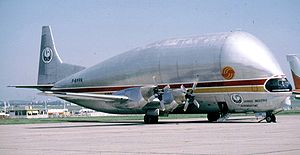| This article needs additional citations for verification. Please help improve this article by adding citations to reliable sources. Unsourced material may be challenged and removed. Find sources: "Aero Spacelines" – news · newspapers · books · scholar · JSTOR (October 2009) (Learn how and when to remove this message) |
 An Aero Spacelines Mini Guppy at the Tillamook Air Museum in Tillamook, Oregon An Aero Spacelines Mini Guppy at the Tillamook Air Museum in Tillamook, Oregon | |
| Founded | 1960 (1960) |
|---|---|
| Founder | John M. Conroy |
| Defunct | 1981 (1981) |
| Products | |

Aero Spacelines, Inc. was an American aircraft manufacturer from 1960 to 1968 that converted Boeing 377 Stratocruisers into the famous Guppy line of airplanes, re-engineered to transport oversized cargo such as space exploration vehicles.
History
Aero Spacelines was formed with only one customer in mind: the National Aeronautics and Space Administration. NASA needed to transport outsize cargo from manufacturing plants such as the Michoud Assembly Facility in New Orleans, Louisiana, to Cape Canaveral Air Force Station in Florida. These items were too large to be safely transported by rail or truck. Shipping by sea was time-consuming, expensive, and risky, with the danger of damaging the cargo on turbulent seas. But no aircraft of the day was large enough.
John M. "Jack" Conroy, a retired United States Air Force pilot, and Lee Mansdorf, an aircraft salesman and entrepreneur, formulated the Guppy concept one evening over dinner. They decided to create a company to manufacture outsized aircraft. Conroy hired Robert W. Lillibridge as vice president of manufacturing and engineering, and a team was assembled for the project. Financing was provided by venture capitalist William Ballon, a World War II combat veteran also from the Army Air Corps. In 1960, Aero Spacelines began working at Van Nuys Airport, California, to transform a Boeing 377 airliner into the Pregnant Guppy.
NASA's Project Gemini made early use of the Pregnant Guppy to transport the first and second stages of Titan II GLV from the Martin Co. in Baltimore, Maryland, to Cape Canaveral, Florida. Subsequent versions of the Guppy series hauled the S-IVB, the third stage of the Saturn booster from California to Florida.

Aero Spacelines was sold in August 1965 to Unexcelled, Inc., a publicly-traded company that had subsidiaries engaged in discount store retailing, meatpacking equipment and iron castings. Unexcelled also owned American Airmotive Corporation, an aircraft maintenance and repair organization.
In 1968, the Civil Aeronautics Board (CAB) gave Aero Spacelines an exemption permitting them to offer Guppy transport services to the public. The CAB was a now-defunct federal agency that, at the time, tightly regulated almost all US commercial air transport. The CAB's permission was required for Aero Spacelines to offer air transport services to the public.
By November 1968, NASA had paid Aero Spacelines $11,591,633 in contracts.
In 1972, Unexcelled changed its name to Twin Fair, the name of its retailing subsidiary. In 1981, Twin Fair sold Aero Spacelines to Tracor, which dropped the name in favor of Tracor Aviation.
Conroy organized a new company, Conroy Aircraft, which built more airplanes for transporting oversized cargo. Conroy ceased operations in 1972.
As of March 2021, one Super Guppy was still in operation. NASA uses it to transport vehicles, and leases it to third parties when not in use.
In early 2016, NASA used that aircraft to transport the main structure of Orion crew capsule, from its Michoud Manufacturing Facility in New Orleans, Louisiana, to the Kennedy Space Center in Florida, where the capsule underwent its first uncrewed test flight aboard the Space Launch System rocket. In November 2019, NASA used the aircraft to transport the Orion capsule from the Kennedy Space Center to the Mansfield Lahm Airport in Ohio for thermal and vacuum tests.
List of aircraft
Aero Spacelines produced three Guppy aircraft models.
- Pregnant Guppy (1962) - 1 built
- Super Guppy (1965) - 5 built
- Mini Guppy (1967) - 3 built
See also
References
- Mondey, p. 9
- Outsize 1968, p. 298.
- "Aero Spacelines, Inc., Outsize Cargo Exemption". Civil Aeronautics Board Reports. 48. Washington, DC: U.S. Government Printing Office: 294–313. January–July 1968. hdl:2027/osu.32435022360259.
- NASA.gov
- Business News Sidelights, Springfield (OH) News-Sun, 9 July 1972.
- Aero Unit Is Sold Buffalo News, 13 September 1981
- "NASA website, updated 12 July 2012: 377SG-201 is still in use". Archived from the original on February 15, 2013. Retrieved February 11, 2013.
- "NASA transports its Mars crew capsule in the belly of a really weird cargo plane". February 2016.
- NASA.gov
- Simpson, R. W. (1999). Airlife's commercial aircraft and airliners. Shrewsbury, England: Airlife. ISBN 978-1-84037-073-7. OCLC 40588036.
External links
- Pregnant Guppy : THE PLANE THAT WON THE SPACE RACE Bloom, Margy. May / June 2010, PILOTMAG Magazine
- It's a Plane: One man's obsession, it helped get us to the moon Tripp, Robert S. Spring 2002, American Heritage of Invention and Technology
- Page about Airbus Industrie's Beluga
- Site about The Guppy Family of Aircraft
- NASA.gov
- The Day the Super Guppy Blew Her Top
| Aero Spacelines aircraft | |
|---|---|
|